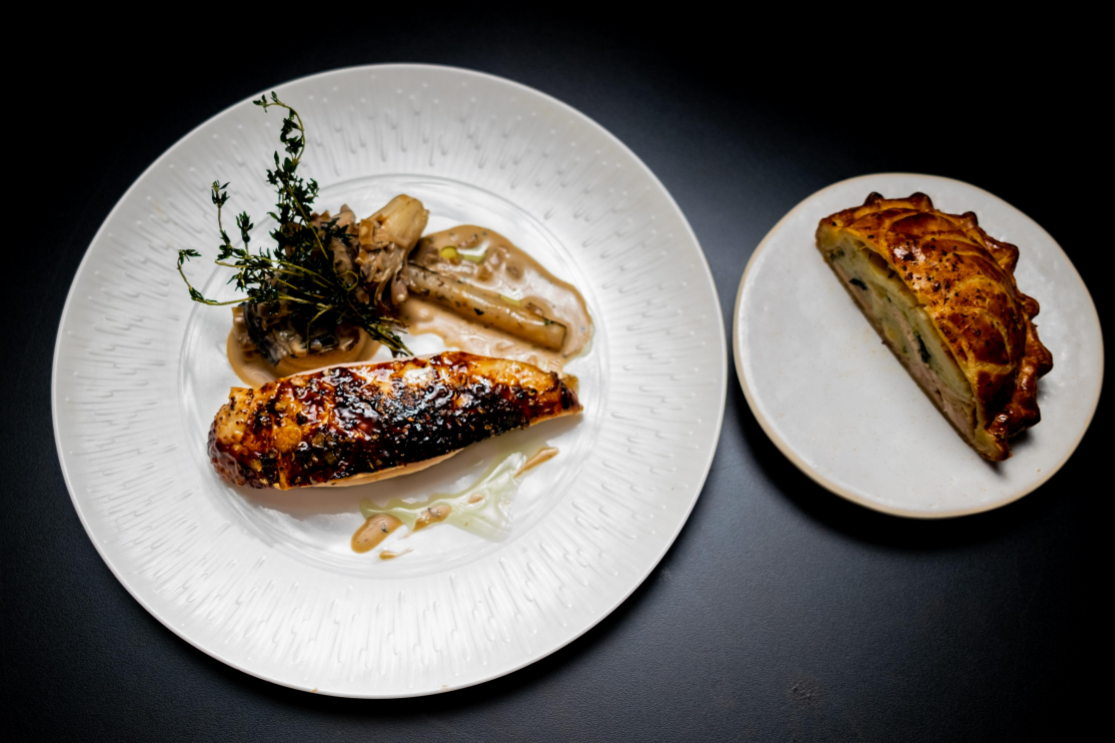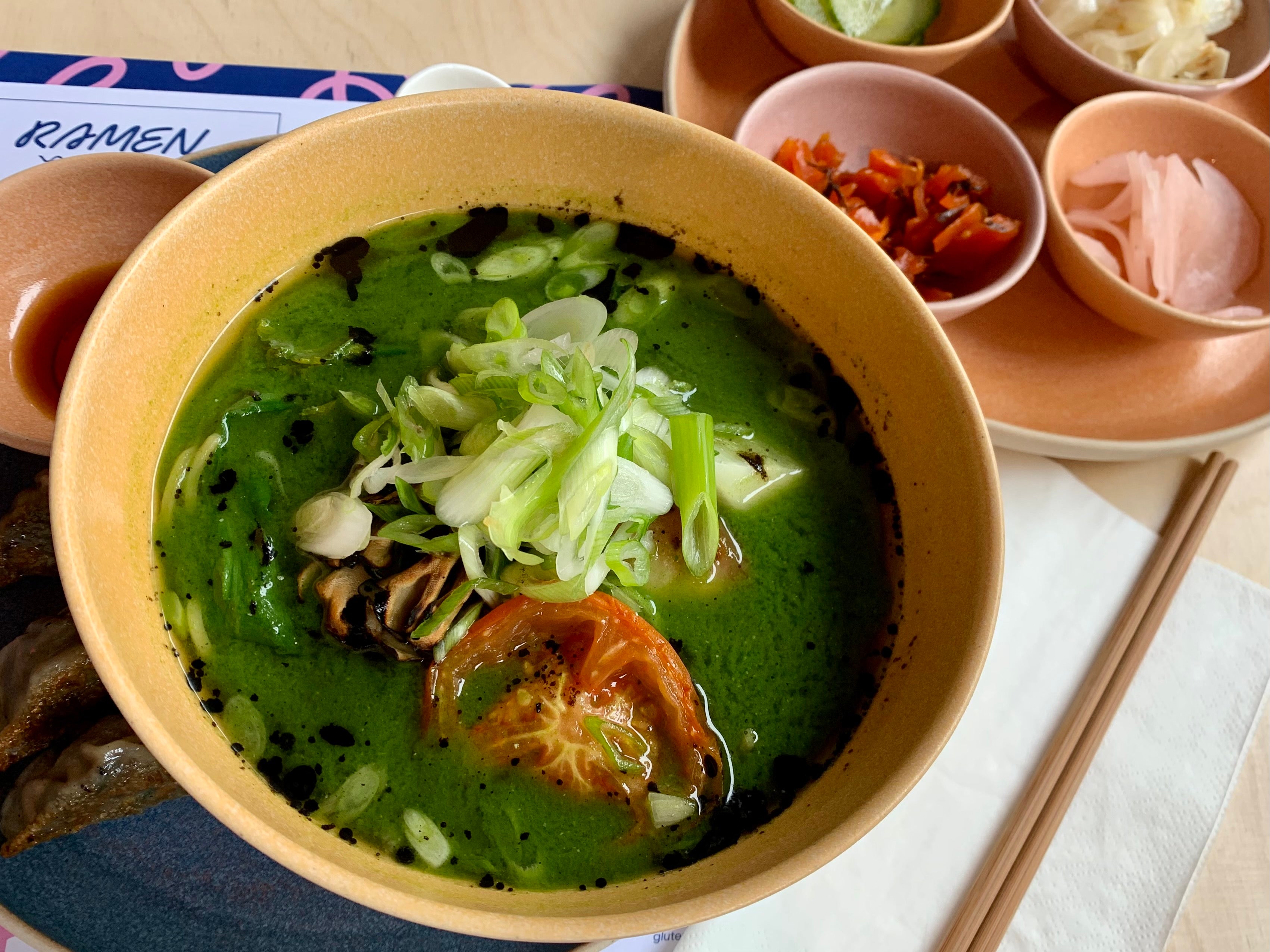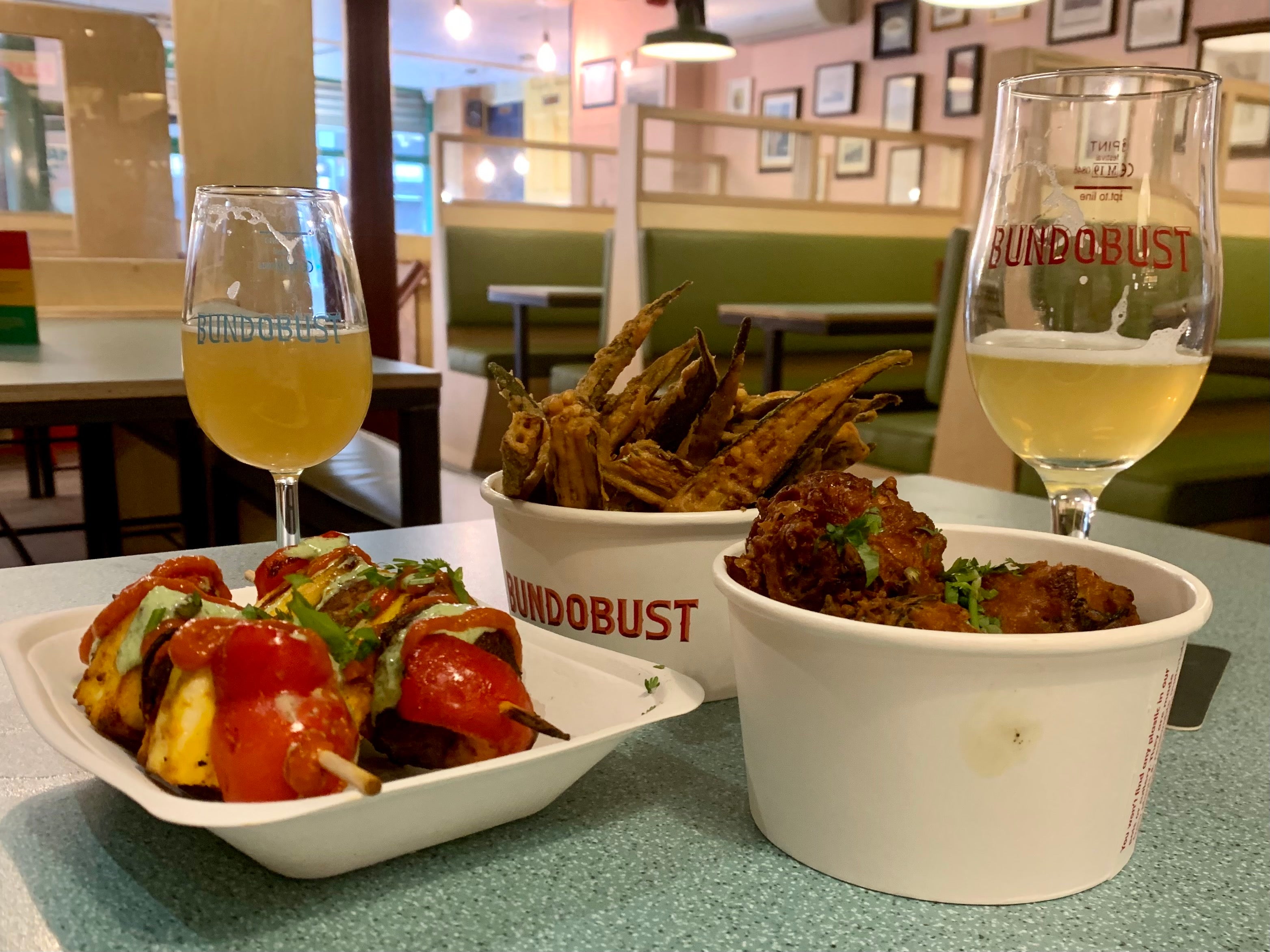How community spirit turned Leeds into a foodie hotspot
Pop-ups, supper clubs and a thirst for local collaborations have put Leeds firmly on the foodie map. Fiona Whitty loosens her belt for a taste tour around some of its stalwarts and rising stars

Ben Iley has barely drawn breath for days, so the chance to perch next to me for a quick chat is particularly welcome. “I’ve not sat down for two weeks,” he says, grinning infectiously. Iley is the head chef at House of Fu, a new noodle bar in Leeds city centre.
I visit on the restaurant’s third day of opening, a wet Monday lunchtime when the streets of Leeds are quiet following England’s loss in the Euro 2020 final the night before. But by 1pm, the restaurant is packed and buzzy, defying the sombre dampness outside. It’s a brave time to launch a new venture, but in this city the concept of eating out is clearly alive and kicking – even if England’s dreams of lifting silverware aren’t.
House of Fu is Iley’s brainchild (you could say love child, so evident is Ben’s passion for the project). His mission is to recreate the ramen he adored while working in Tokyo for nine years. “You’d compete with friends to see who could find the best place,” he reminisces.
Returning to Leeds in 2014, Ben was determined to head up his own ramen bar. But first, he grafted away with a Belgrave Music Hall pop-up, at supper clubs and on the food festival trail, before shelving restaurant plans as he felt the timing wasn’t right. It is now.

As well as ramen, rice bowls and a tempting raft of sides, House of Fu serves gyoza dumplings made to Ben’s Japanese wife Masayo’s family recipe. Beer from Yorkshire breweries and bespoke furnishings and artwork created by local studios add a strong Leeds flavour. As someone who’s lived in Japan, I can vouch for Fu being authentic in its simplicity, quality and value for money – my warming bowl of vegan green ramen in miso and shiitake broth is packed with taste and my shiitake and kale gyoza beautifully seared while moist inside.
“I couldn’t imagine doing this anywhere else,” says Ben. “Leeds is like a big village. Everyone knows each other so you can bounce ideas around and get great feedback.”
This supportive Leeds community – and the hunger to offer something different – are themes you hear repeatedly here. Leeds has always been a hub of innovation: once central to Britain’s textile and wool trade, it reinvented itself more recently into a financial and legal base second only to London. Fuelled by an influx of students and young professionals – Asda, NHS Digital and Jet2 all have headquarters in the city, while parts of HMRC and Channel 4 are currently moving up – a vibrant food scene began to erupt.
Leeds is like a big village. Everyone knows each other so you can bounce ideas around and get great feedback
Over at south Indian restaurant Tharavadu, Siby Jose and four friends set out to recreate the home cooking they loved when growing up in Kerala. “The 16 or 18 Indian restaurants in the city centre all had the same menus,” recalls Siby. They saw an opportunity for something more localised. The menu certainly sounds different to others around town, like our starters of padipura – crisp deep-fried seafood – and kozhi dosa, a popular street food dish of chicken mixed with rice and lentils and served with a domed paratha.
Main courses of meen koottan – fish cooked in tamarind – and marari prawn masala, named after the small village where eating this ginger, garlic and cinnamon sauce-heavy dish is a ritual, are similarly delectable. The drinks menu includes a beer made especially for Tharavadu by Leeds Brewery. It’s little wonder that the restaurant has netted a bundle of awards, including a Michelin Plate.
Next door, craft ale bar Bundobust offers a contemporary flourish on the traditional curry-and-a-beer game, serving its own homebrew alongside vegetarian Indian street food made to the same recipes that co-owner Mayur Patel’s mother used to prepare for him. Okra fries are the most popular dish, crisp slices of the vegetable in chickpea batter with a dusting of mango powder, while beers made in the Bundobust microbrewery are stocked on rotation. Notably the salted lemon sour – a riff on Bundobust’s popular nimbu pani lemonade – is a clever collaboration with the Leeds-based North Brewing Company.

Like many of Leeds’ restaurant entrepreneurs, Patel and business partner Marko Husak started with a pop-up before launching a permanent set-up. These street food stalls at places such as Trinity Kitchen, Kirkgate Market and Belgrave Music Hall allow chefs to test the water without committing to long-term leases.
Over in Kirkgate Market, chefs Liz Cottam and Mark Owens have launched The Owl, the market’s first proper restaurant and an upmarket one at that. A former Masterchef contestant, Liz perfected her kitchen skills at pop-ups and supper clubs before teaming up with Mark and opening high-end restaurant Home, followed by The Owl. It slots in next to Kirkgate’s bustling Fish Row seafood counters, its austere charcoal-wood exterior belying the intricate enterprise within that’s earned it a Michelin Plate.
“I want to trailblaze,” says Liz. “I want to show that there’s so much more to the market than traditional no-frills.” The food is fresh, delicate and seafood heavy: exquisite taste is matched by pristine presentation in starters of blowtorched North Sea bream and wild sea trout with razor clams, and main dishes of halibut with samphire in a curried mussel sauce, or Gloucester Old Spot pork belly with celeriac, chicory jam and lobster.
I want to trailblaze; I want to show that there’s so much more to the market than traditional no-frills
Elsewhere, cool Japanese restaurant Blue Sakura has reinvented the all-you-can-eat concept by allowing customers to have as much of its classy sushi, curries, stir fries and grills as they like – but preparing them to order. Ox Club, meanwhile, has been earning plaudits for its menus crafted over charcoal and wood on a grill imported from Michigan.
Leeds’ café culture is booming too. Tucked quietly away in Queens Arcade off shopping street Briggate is Olive and Rye, which offers locally sourced delights such as apple and fennel black pudding benedict, a tasty twist on a classic. Over at Laynes Espresso, the scrubbed wood tables, tiled walls and piles of pastries give it an old-style French feel but its food offering is bang up to date – their new tofu scramble, for example, is part of a vegan drive.
All this points to it being the perfect time to visit Leeds. The streets remain quieter due to fewer office workers post-Covid, and hotels are tempting visitors back with great offers. We plump for the Malmaison, a few minutes’ walk from both the main train station and the buzz of the city centre.
Nearby cocktail bar Hedonist is pioneering its Project One – creating cocktails with just one unit of alcohol so customers know exactly what they’re consuming. We try their Hedonuzzi, which contains Italicus liqueur, dry vermouth and Campari; it’s big on taste despite being low on booze.
Kirkstall Brewery on the outskirts produces a range of beers, including the popular gluten-free Virtuous, but partnerships with local businesses are key. “It’s an excuse to get together with like-minded people over a few beers,” says managing director and co-founder John Kelly.
They’re currently rebrewing a sell-out beer they made for Bundobust, an Indian pale lager called IPL (as in Indian Premier League) – a nod to the brewer’s love of cricket. Kirkstall also makes an IPA for Whitelock’s Ale House, Leeds’ oldest pub.

Whitelock’s itself, hidden away down an alley off Briggate, is a proud champion of Yorkshire ales, with several on cask, such as the New England Session Pale from small-batch brewer Anthology. The pub’s been going since 1715, a steely part of Leeds’ rich heritage. “We’re the custodians of so many people’s memories so we can’t muck it up,” says operations manager Dave Herbert. “People come in saying they met their husband or wife here 50 years ago. Then there was the man who said his dad used to sit him on a barrel outside while he had a couple of post-work pints.”
Much of Whitelock’s’ menu is sourced locally, too – such as the ice cream made by Northern Bloc using fresh ingredients. Their start-up is a familiar tale here in Leeds – a pop-up street food stall at Trinity Kitchen, followed by supper club and festival appearances. The brand’s raspberry and rhubarb sorbet sour beer made with North Brew brewery sold 50,000 cans within weeks, and now it’s fusing its talent for flavour with seasoned locals on the food scene. “There’s a collaborative rather than a competitive spirit here,” says co-founder Josh Lee. “Leeds has a great vibe.”
Travel Essentials
Getting there
Travel to Leeds by train from London with LNER from £37 return, or from Peterborough from £21.40 return. Direct trains also stop at Stevenage, Grantham, Retford, Newark North Gate, Doncaster and Wakefield Westgate.
Staying there
Doubles at the Malmaison start from £120, room only.
More information
For more ideas of what to do, see visitleeds.co.uk.




Join our commenting forum
Join thought-provoking conversations, follow other Independent readers and see their replies
Comments